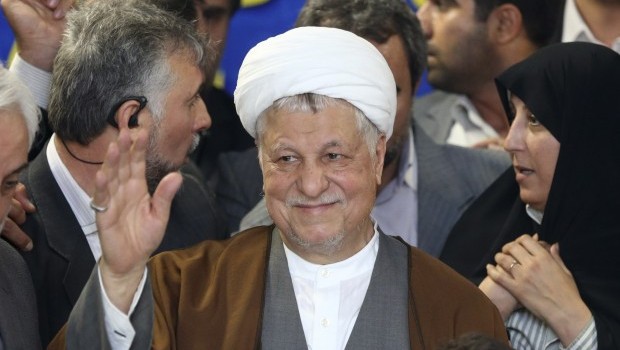
In this picture taken on Saturday, May 11, 2013, former Iranian President Akbar Hashemi Rafsanjani waves to media as he registers his candidacy for the upcoming presidential election, while his daughter Fatemeh, right, looks on, at the election headquarters of the interior ministry in Tehran, Iran (AP Photo/Ebrahim Noroozi)
Ayatollah Hashemi Rafsanjani said he wanted to solve the huge economic and political problems facing Iran in a meeting with his supporters, according to a statement on his official website posted Thursday morning.
The cleric, who served as Iran’s president between 1989 and 1997, was barred from running for president once more earlier this week by Iran’s Guardian Council, a constitutional watchdog that vets all presidential and parliamentary candidates.
Hashemi Rafsanjani said his decision to enter the race at the last minute was due to intense pressure from representatives from all sections of society, including revered clerics from Qom, Najaf, and Mashad.
The statement said: “The next government will inherit a huge collection of socio-economic problems caused by mismanagement and incompetency as well as economic sanctions.”
“Whoever that can serve and solve such crisis should be appreciated and provided with assistance.”
Other reports of the meeting offered further details about Hashemi Rafsanjani’s assessment of the predicament facing Iran. According to pro-reform Saham News website, Hashemi Rafsanjani warned about new legislative measures being prepared against Iran by the US congress, which he said were aimed at causing the disintegration of the country.
He also reminded his supporters of other threats to Iran from Israel and the US.
“They [the current ruling faction] do not know what they are doing to the country. There is very little money left, and [more] cannot be brought in due to sanctions and in short, even with any conspiracy, no worse than this could have happened to Iran,” Hashemi Rafsanjani is reported to have said.
According to the Jahesh news website, he also said that a foreign policy focused on pursuing détente, together with economic reform and growth is the only solution to Iran’s problems.
For the eight presidential candidates approved by the Guardian Council, the official 21-day election campaign period began on Thursday morning. Mohammad Baqer Qalibaf, the mayor of Tehran, from “1+2” conservative coalition has chosen the south-western city of Khorramshahr to launch his campaign. Qalibaf is trying hard to assemble a coalition of voters among both the poor and more affluent sections of Iranian society, and the contents of his manifesto focuses on mistakes made by the current administration.
Ali Akbar Velayati, a former foreign minister, also began his campaign in the provinces. Speaking in the north-eastern city of Gorgan, he promised not to use radical and fundamentalist figures in his government if elected, and in another speech pledged to introduce measures to control inflation within 100 days of taking office.
